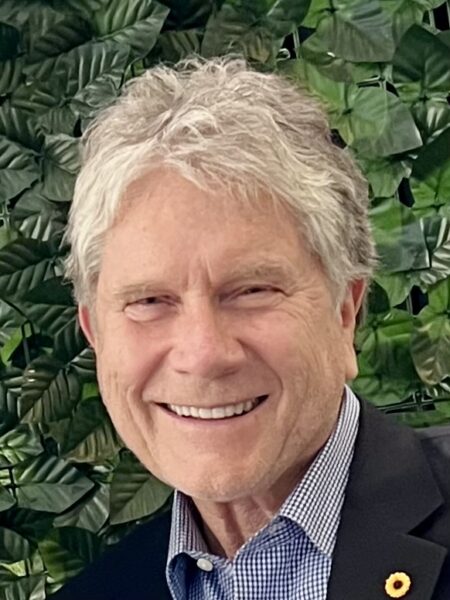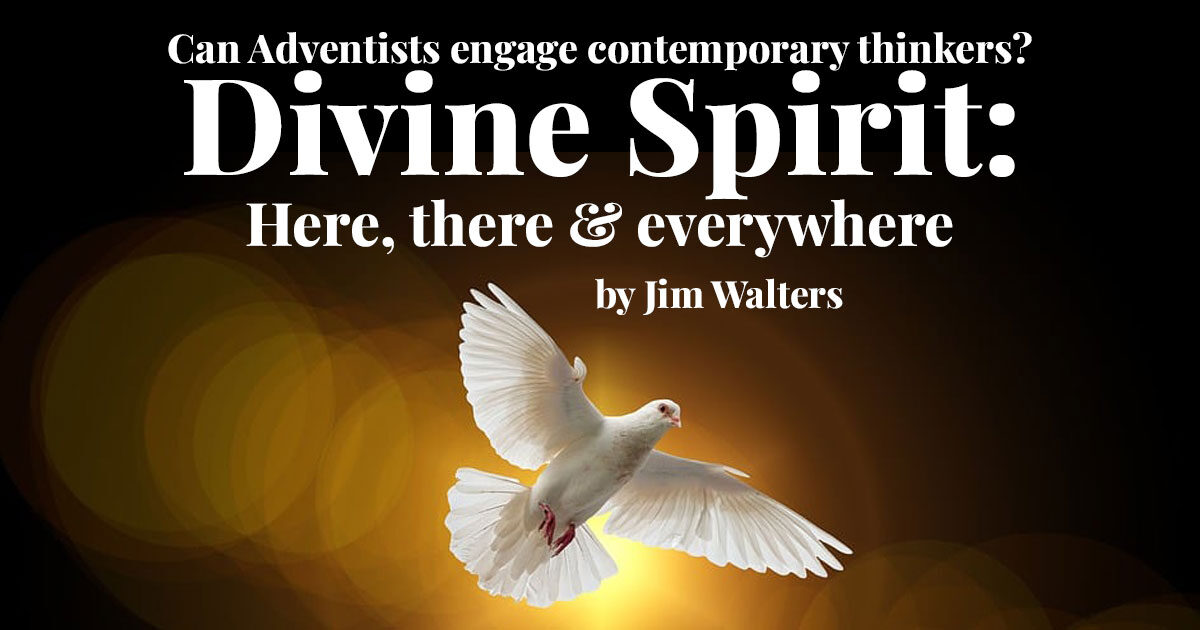Engaging Contemporary Thinkers: the Omnipresent Divine Spirit
by Jim Walters | 6 February 2025 |
I’m Adventist, born and reared. I’m also fairly well educated and well-read. Too, I see myself as a moral person, striving for high integrity.
Now, I—like perhaps many of you readers—have questions about particular church doctrines, such as Hiram Edson’s cornfield vision that became our unique sanctuary doctrine, and the teaching of a literal 6,000-year-ago creation.
But I must confess that for some time I’ve been questioning at a deeper level: belief in the concept of God itself.
I surely can’t believe in a genocidal God (Deut. 20:16,17). But for years I’ve grappled both personally and professionally with the sort of God I can believe in. Today, without qualms, I happily confess my belief.
But not my longtime friend Tom. Tom is a recently retired internist who’s board-certified in a sub-speciality. Tom is innately inquisitive. He loves nature and takes great shots with his sophisticated camera. He’s a world traveler. And he’s widely read in science, philosophy, and religion.
Tom is the son of an Adventist pastor. But he’s now a self-described secular humanist. Tom is absent a hostile bone in his modest frame. In fact, he’s deeply appreciative of his Adventist background—particularly its educational emphasis that he happily attributes to Ellen White.
Tom personifies what the late 19th-century Harvard philosopher William James labeled a “religious skeptic”: a person who trades religion for the supposed safety of science. Although Tom doesn’t believe in God, I think he’d like to—but being a man of high integrity, he can’t engage in believing the unbelievable. Such belief would violate his conscience.
Conscience
Conscience is the undergirding element in 1 Thess. 5:21, where this counsel is given: “Test all things; hold fast what is good.” And by what can one test “all things,” except by criteria that make sense to a situated person? Every one of us lives in a particular time and place.
It’s easy to say we believe this. But not too many of us plumb the implications. If I’d been an average person in 18th-century America, I’d surely have believed in ghosts. And if I were one of the newly baptized Adventist members in Papua, New Guinea, I might also believe in or strongly suspect the existence of evil spirits.
The apostle Paul presupposes the value of a person being authentic to oneself—inescapably in the cultural, intellectual setting in which one finds oneself. The implications for an Adventism, now spread across so many different people-groups, are immense. Is individual conscience prized? Is global uniformity mandated? An intrinsic tension seems inevitable. A lurking issue is whether church leaders will even recognize this dilemma, to say nothing of courageously confronting it.
Conscience was emphasized to me as a student at Southern Missionary College (as it was called in 1962) when I took a class in education taught by the kindly Dr. Kennedy. Our textbook was Ellen White’s little red book Education—which I still have, all marked up, with “memorize” written next to certain passages.
One sentence so noted is this one: “The greatest want of the world is…men whose conscience is as true to duty as the needle to the pole…” (p.57). However, I don’t see such an emphasis in today’s Adventism; rather, the emphasis has shifted to doctrinal loyalty, particularly to the 28 fundamental beliefs.
(Note: when the original Fundamental Beliefs were adopted at the General Conference session in Atlanta, 1980, they were perceived as descriptive rather than normative. However, at the October 2024 Annual Council, a new list of offenses for which an employee can be disciplined was voted; #3 is “Dissidence—In the case where an employee openly expresses significant dissidence regarding the fundamental beliefs of the Seventh-day Adventist Church.”)
Belief
William James’ case for viable religious beliefs isn’t so broad that it includes just any beliefs: some ideas should be rejected on purely intellectual grounds. (Essays on Faith and Morals, p.39) For example, one belief that would fail his test is the flat earth, even though John the Revelator speaks of the earth’s “four corners” in Rev. 7:1. A genuine religious option must be live (vs. dead), forced (vs. easily avoidable), and momentous (vs. trivial).
I personally can’t think of a single case in which it would ever be morally right for a person to believe something against one’s conscience. Accordingly, what type of God-belief—one that’s a genuine option, an honest one—might I recommend to my friend Tom?
I suggest God as Divine Spirit: here, there, everywhere, always. Divine Spirit is not contrary to science. Spirit is the author of science. Spirit complements science.
Tom has recently been studying the late Daniel Dennett’s From Bacteria to Bach and Back: The Evolution of Minds. I’ve personally learned both positively and negatively from Dennett, and mentioned to Tom that Dennett’s index has 20+ entries on “intelligent design” (Dennett purposefully chose lower case). Dennett aimed to write “so that, for the first time, doubters can take seriously the prospect of a scientific, materialist theory of their own minds” (pp.14-16). Never in all 477 pages of rich science-informed philosophizing does Dennett even allude to the source of his wonderful explanations of “intelligent” bottom-up evolution and top-down mind-directed design.
Understandably, materialist Dennett doesn’t address the “source” issue, but there are other significant issues in nature that cry out for some explanation:
- The order of the universe, as though it’s “fine-tuned” for life
- The apparent objectivity of logic and mathematics
- The “natural laws” throughout the known universe
- The existence of novelty and directionality in evolution
But these marvels of nature don’t have to be explained. We can just accept them—or do as Tom does: be in awe of a spectacular sunrise and shoot a great photograph. Maybe a myriad of spectacular coincidences is all there is to the universe(s).
Thinking about God
Some leading scientists, such as Arthur Peacocke and Paul Davies—to say nothing of Alfred North Whitehead and Albert Einstein—see the need to include God. Peacocke doesn’t shy away from seeing God in this process; in fact, he thinks it’s more adequate, both scientifically and philosophically: God “continuously creates through the processes of the natural world.” (Stanford Encyclopedia of Philosophy, “Panentheism”) And Peacocke would agree with process theology that contends: “Without God, the world would be nothing more than an unchanging existence radically different from the actual world of experience” (Ibid.)
Might Peacocke and his kin be wrong, and Tom and other secular humanists be correct? Yes. But Peacocke and other panentheists (who see God in the world, but also beyond the world) may be onto something more adequate. Philip Clayton, author of The Problem of God in the Modern World, is convinced that panentheism—a third option beyond classical theism and simple pantheism—offers the most complete explanation of our vast, postmodern knowledge of human and cosmic nature.
Clayton invites others to consider his panentheistic “philosophical research program.” He’s open to better explanations, but for now he enjoys distinguished company:
- Paul the apostle:
- “What therefore you [Athenian philosophers] worship as unknown, this I proclaim to you. The God who made the world and everything in it, being Lord of heaven and earth, does not live in shrines made by man, nor is he served by human hands, as though he needed anything, since he himself gives to all men life and breath and everything…. Yet he is not far from each of us, for ‘In him we live and move and have our being’; even some of your poets have said, ‘For we are indeed his offspring’” (Acts 17:23-28).
- Gregory the Theologian, the 4th-century Cappadocian father:
- “The most exalted archangel is, in metaphysical terms, no closer to God than a stone: God transcends all creatures infinitely” (Gregory Nazianzen, Oratio 28.3, ed. A. J. Mason [Cambridge : Cambridge University Press, 1899], 26; as cited by Andrew Louth, “The Cosmic Vision of Saint Maximos the Confessor”).
- Thomas Aquinas:
- “God exists in everything; not indeed as part of their substance or as an accident, but as an agent is present to that in which its action takes place…. Now since it is God’s nature to exist, he it must be who properly causes existence in creatures, just as fire itself sets other things on fire…. So God must exist intimately in everything” (Saint Thomas Aquinas, Summa Theologiae [London and New York: Blackfriars, 1964, 2:113]; as cited by Niels Henrik Gregersen, “Three Varieties of Panentheism,” 23, In Whom We Live and Move and Have Our Being).
- Ellen G. White:
- “Every seed that sends up its green blade to the sunlight declares the wonder-working power” [of God]…. The material world is under God’s control…. Cloud and sunshine, dew and rain, wind and storm, all are under the supervision of God, and yield implicit obedience to His command. It is in obedience to the law of God that the spire of grain bursts through the ground…. These the Lord develops in their proper season because they do not resist His working” (Christ’s Object Lessons, 80-82).
- David Ray Griffin, a philosophical theologian, hazards an answer:
- “…the most fundamental causal principles of the universe exist naturally, being inherent in the nature of things, because they exist in the very nature of God” (David Ray Griffin, “Panentheism: A Postmodern Revelation,” in In Whom We Live and Move and Have Our Being: Panentheistic Reflections on God’s Presence in a Scientific World, Philip Clayton and Arthur Peacocke, eds. [Grand Rapids, Mich: William B. Eerdmans Publishing Company, 2004, 43].
“In him we live, and move and have our being,” said Paul. God as Divine Spirit is the only true Infinity—a numinous, unspeakable, unwritable mystery. Divine Spirit concerns the origin, the continuous operation, and the end-goal of all that is.
 Jim Walters is professor emeritus of Loma Linda University’s School of Religion. This essay is the second of three—all based on Jim Walters’ Divine Spirit Both Grounds and Animates Science’s Domain, presented at the Adventist Society of Religious Studies conference, November 2024. In the final essay, The Rider and the Elephant: Emotion Steers Reason, Jim will examine our contemporary scientific worldview and how reason and affect contend for priority.
Jim Walters is professor emeritus of Loma Linda University’s School of Religion. This essay is the second of three—all based on Jim Walters’ Divine Spirit Both Grounds and Animates Science’s Domain, presented at the Adventist Society of Religious Studies conference, November 2024. In the final essay, The Rider and the Elephant: Emotion Steers Reason, Jim will examine our contemporary scientific worldview and how reason and affect contend for priority.




